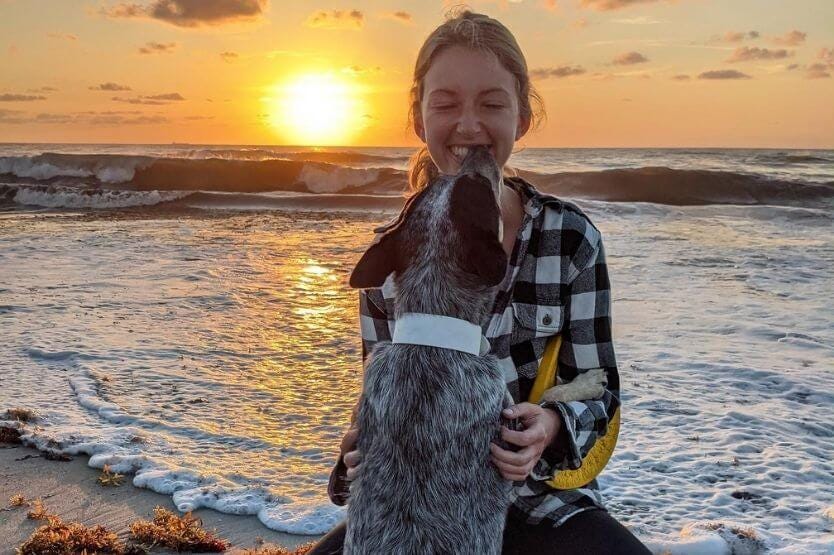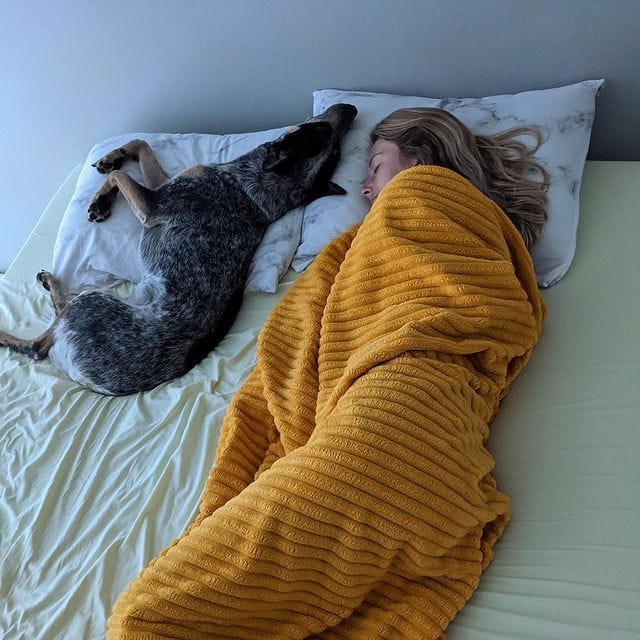How I handle getting frustrated with my dog
This post was first written in June 2021 and last tweaked in July 2024.
I’d love to tell you I am a perfect pet guardian who lives in a delightful rosy world and never gets frustrated with my dog.
But that would be a lie.
In reality, Scout has annoyed me a lot since I brought her home (especially when her fear-based dog reactivity first emerged). I’ve felt defeated. I’ve lost my temper. I’ve done things I am not at all proud of.
It’s normal to struggle sometimes—even, and especially, in the relationships we care about most—but that doesn’t make it any easier to swallow. Here’s how I try to handle my inevitable moments of frustration to keep our dog-owner bond strong in the long run.
(You can also read more about my overall emotional growth in this article and, to be honest, the bulk of our Instagram posts.)
In the moment: I try to notice my emotions as quickly as possible.
When I start to feel tense, I stop and ask myself why.
It’s taken practice, but over time I’ve been able to sense earlier and earlier when I’m beginning to feel frustrated. If I can catch those emotions right when they start—if I can interrupt our activity at the very first inkling of “this is no longer fun”—I can keep myself from escalating.
I’m far from perfect at this. I still have moments where I realize far too late that I’m getting overwhelmed! But by and large, greater self awareness has been the most important thing for me to work on to be better for Scout.
Pause: I take the shortest break I need to.
Sometimes I need a long reprieve after my initial pause. Other times it just takes a few deep breaths before I feel ready to go again.
The key, though, is that I take the shortest break possible. If a full day is what I need, then I give myself a full day. But I try not to delay beyond what feels absolutely necessary to be in a healthier state of mind. (Otherwise I get caught in a state of inertia and all the negative stuff just seems to fester.)
And reflect: Specific concepts I think about
To work through my moments of frustration…
I remember our marble jar.
One of the most helpful analogies I’ve found for life with my dog is that our relationship is like a jar of marbles.
When I advocate for her, make things fun, and build trust? We put a few marbles in! When I make a mistake, confuse her, or react unfairly? We take a few marbles out.
Conceptualizing my growth with Scout this way helps me remember to look at averages over single data points. I can absolutely still celebrate the individual wins (and let myself grieve individual slip ups)—but it’s most important to evaluate the trend of our relationship as a whole.
If I’ve just lost my temper, it’s helpful to recall all the good moments we’ve shared together. If I’m afraid we’ll never recover, I find solace in reflecting on other times I’ve taken marbles out and things have still turned out okay.
And above all else? Picturing our marble jar gives me the opportunity to choose to put marbles in instead of taking them out.
I think about how precious Scout’s life is.
I can become “blind” to a lot of things in the heat of my frustration. I’ll feel angry and overwhelmed and bristly… and I’ll forget what matters most.
When this happens, it helps to remind myself just how limited my time with Scout really is. I know it sounds morbid. But the simple truth that one day I will have to live without my dog—I will have to survive without her soft presence, her silly antics, her warm breath—always snaps me back to reality.
How can I be mad at her right now when I know that in a decade I’d do anything to have her back with me? How can I waste the precious moments we get to share?
I recall how guilty I’ve felt in the past.
Along similar lines, it can also be productive to remember how guilty I’ve felt after losing my temper in the past.
I particularly love Brené Brown’s distinction between shame and guilt. Shame is an unhealthy, painful internalization that makes us feel unworthy as people. Guilt, on the other hand, is “adaptive and helpful—it’s holding something we’ve done or failed to do up against our values and feeling psychological discomfort.”
When all I can see is my current annoyance, taking a moment to recall the intense guilt I’ve experienced after being unfair to Scout in the past can be an immediate cure. My frustration will inevitably fade. But if I let it push me to act in ways that contradict my love and commitment to Scout? The deep disappointment will linger much longer.
After taking space: I read my dog’s body language and go from there.
Scout is very attuned to my emotions. If I felt myself getting frustrated? She definitely did too!
It’s easy for me to overwhelm her in these situations, so I pay careful attention to how she seems to be feeling. If we both bounce back quickly, it’s business as usual. If she seems a little uncertain, I’ll take things more slowly.
I want to get “on a positive note” as quickly as possible—but I also don’t want to force her to interact with me (or a certain environment) if she needs more time to recover. It’s all about balance.
I’m only human—but all creatures can grow!
The moments in which I have been unfair to Scout are some of the worst of my life. They haunt me at the most random times—when she looks up at me with those soulful eyes, when she comes to me after getting scared, when she shoves her favorite toy into my hand for a game.
I often feel that I don’t deserve her love. And maybe I’m right. Maybe none of us deserve the devotion of a dog.
But I will work every day to try to earn it. To ask myself, after messing up, what I can do differently next time. How can I avoid getting frustrated in the first place? How can I handle it more gracefully when I do? It will never be a perfect process, but we are resilient, and we are a team.
We only grow better as time goes on.










